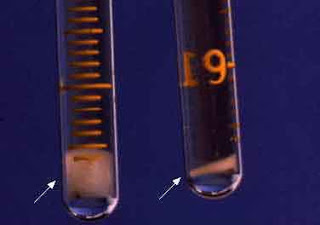 Mixed cryoglobulinemia (MC) is a systemic vasculitis in which B cell clones produce IgM with rheumatoid factor activity. The disease can range in severity from isolated skin lesions to full blown renal and neurological involvement. Most patients are HCV positive although about 25% have essential mixed cryoglobulinemia (EMC) where no underlying cause is found. Traditional therapy for MC included treating the underlying cause along with cytotoxic drugs but this is associated with significant complications.
Mixed cryoglobulinemia (MC) is a systemic vasculitis in which B cell clones produce IgM with rheumatoid factor activity. The disease can range in severity from isolated skin lesions to full blown renal and neurological involvement. Most patients are HCV positive although about 25% have essential mixed cryoglobulinemia (EMC) where no underlying cause is found. Traditional therapy for MC included treating the underlying cause along with cytotoxic drugs but this is associated with significant complications.
We recently had a patient with EMC and significant renal involvement who we decided to treat with rituximab. Rituximab is a monoclonal antibody directed at CD20, a transmembrane protein expressed on B lymphocytes, which has been shown to delete expanding clones of B cells. There is growing evidence that rituximab is effective in treating MC in HCV-positive and HCV-negative patients. A recent meta-analysis found that complete and partial responses to rituximab therapy were noted in 80-93% of patients with MC. Relapses were more common in the HCV-positive group with 39% relapsing within 12 months – probably as a result of the ongoing presence of the viral antigen. The doses and treatment lengths varied significantly among the studies and there is no definite treatment protocol that has been shown to be universally effective as yet.
There are some potential complications associated with rituximab therapy in these patients. It has a tendency to increase HCV viremia potentially leading to worsening liver disease although a recent study found it to be effective and safe in a group of patients with severe liver disease. Another potential complication arises from the fact that rituximab is an IgG1kappa chimeric antibody as it appears to bind to the IgM paraprotein in some cases leading to the deposition of more immune complexes and worsening of the vasculitis. This complication is seen particularly in those treated with high dose rituximab (1g) and suggests that lower dose therapy (375mg/m2) may be more appropriate.
Our patient responded well to rituximab therapy. He received four weekly doses of 375mg/m2. His creatinine has fallen from a peak of 3.6 to 1.4 and his proteinuria has resolved. It will be interesting to see if he remains in remission over the coming months.
So MC is added to the growing list of renal diseases that can be effectively treated with rituximab. See previous blog posts on the use of rituximab in patients with ANCA-associated vasculitis, transplant glomerulopathy, lupus nephritis and membranous nephropathy.
A note of thanks to Dr Hamburger for his help.



what about MCD and FSGS